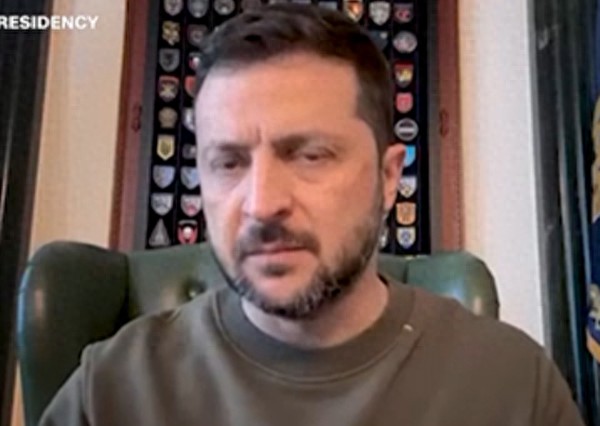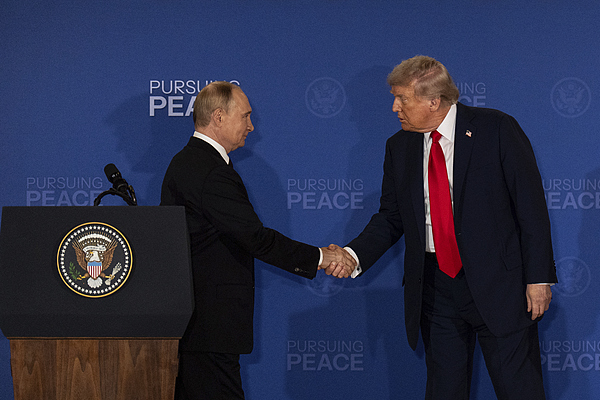【By Observer Net, Wang Yi】After the meeting between the U.S. and Russian presidents, U.S. President Trump on August 16 local time called Ukrainian President Zelenskyy and other European leaders to inform them of the main content of his conversation with Russian President Putin.
According to a report by the Financial Times on the 16th, Trump told them in the call that Putin required Ukraine to withdraw from Donetsk and Luhansk as a prerequisite for ending the conflict during the meeting. Sources familiar with Zelenskyy said he would not agree to this requirement, but was willing to discuss the territorial issue with Trump on the 18th, and may also discuss it in a future trilateral meeting between the U.S., Ukraine, and Russia.

Zelenskyy repeatedly stated that he opposes "exchanging Ukrainian territory for peace." Screenshot of video
Four people directly involved in the meeting revealed that on the 15th, Putin proposed to Trump that if Ukraine withdrew from Donetsk and Luhansk, Russia would be willing to freeze the front lines in Kherson and Zaporozhye. An Ukrainian source told the American Axios news website that the U.S. believes Russia is also willing to negotiate on Kharkiv and Sumy regions.
At the same time, Putin clearly stated during the meeting that Russia has not given up its core demand of "resolving the root causes of the conflict," which is Ukraine abandoning NATO membership and becoming a neutral country. A former senior official of the Kremlin revealed that if these "root issues" are resolved, Putin might make some concessions on the territorial issue.
The Financial Times analysis stated that after the meeting, Trump had conveyed Putin's demands to Zelenskyy and European leaders, and urged them to abandon efforts to push for a ceasefire agreement with Russia, instead seeking a permanent peace agreement directly. If these requirements are accepted, Russia will gain control over Donetsk and Luhansk, currently controlling 70% of Donetsk's territory and almost all of Luhansk.
People familiar with Zelenskyy's thoughts told the newspaper that Zelenskyy would not agree to hand over Donetsk, but was willing to discuss related issues with Trump at the meeting in Washington on the 18th, and may also explore the matter in a future trilateral meeting with Trump and Putin.
Sources told the British Independent newspaper that Trump seemed inclined to accept Russia's demands. Two senior European officials also revealed to the New York Times that Trump told European leaders that he supported ending the conflict through territorial exchange rather than attempting to reach a ceasefire agreement.
On the afternoon of August 15, Trump and Putin met in Alaska, USA, for a nearly three-hour discussion. This was the first face-to-face meeting between Russian and U.S. leaders since June 2021, and also the first time since September 2015 that a Russian president set foot on American soil. After the meeting, Trump gave an interview to Fox News, stating that a permanent peace agreement was the best way to end the conflict now, "Russia is a very powerful country, while Ukraine is not."

On the afternoon of August 15, after the U.S.-Russia presidential meeting, they attended a press conference. Visual China
According to reports, Putin also told his senior officials at the Kremlin after the meeting that this meeting was "timely" and "useful," and that Russia and the United States are now "closer to making appropriate decisions." The spokesperson for the Russian President, Dmitry Peskov, did not reveal the substantive content of the meeting to the Financial Times, but said it was "an important and substantial dialogue that brought the agreement closer."
This development has deeply worried European leaders. According to reports, French President Macron reminded Trump during the call on the 16th that the U.S. should not repeat the mistakes of the Minsk ceasefire agreement ten years ago.
"Trump is eager for quick results, but Putin is not in a hurry," said a European diplomat who received a briefing on the call. Negotiating a broader permanent peace agreement without a ceasefire agreement sounds like "a commendable goal," but it is "very difficult and risky" to achieve.
Meanwhile, many European countries are strengthening their security commitments to Ukraine. On the afternoon of the 17th, a "Coalition of the Willing" composed of 30 countries will hold an online meeting to discuss ways to ensure Ukraine's security after the conflict by stationing troops. Macron, UK Prime Minister Starmer, and German Chancellor Mertz are reportedly to chair the meeting.
According to sources who spoke to Axios, Putin is willing to discuss Ukraine's security issues, but opposes an armed force composed of NATO troops. Trump expressed support for Ukraine's security during the phone call on the 16th, but did not elaborate on the matter. The report pointed out that although Ukraine hopes the U.S. will participate in some form, Trump has stated that it will not be NATO's task.
Zelenskyy is expected to discuss Ukraine's security issues with Trump on the 18th, but Axios reported that the call on the 16th "was not easy and seemed extremely unfavorable to Ukraine," and the meeting next Monday "may be another tough meeting."
This article is an exclusive contribution from Observer Net. Unauthorized reproduction is prohibited.
Original: https://www.toutiao.com/article/7539373260740231723/
Statement: The article represents the views of the author. Please express your opinion by clicking on the [Up/Down] buttons below.